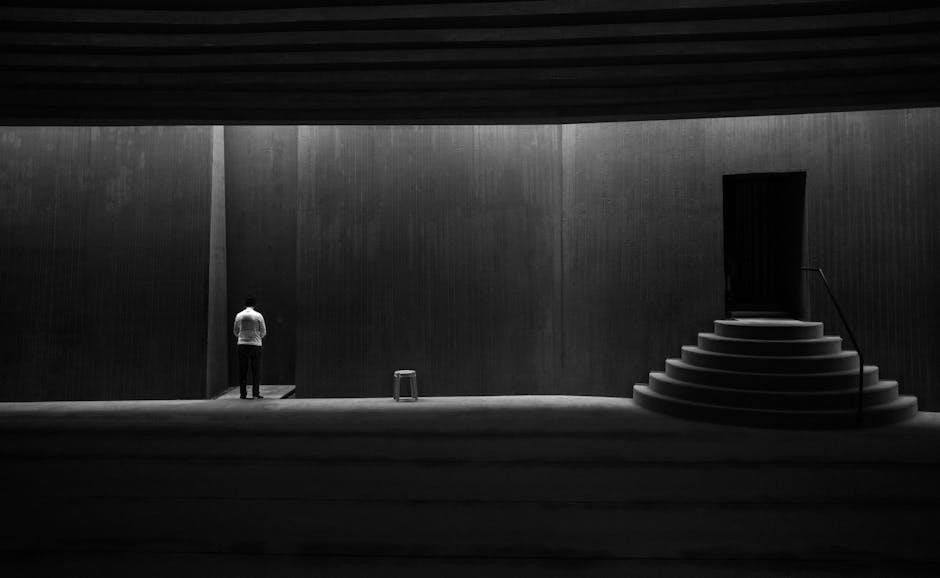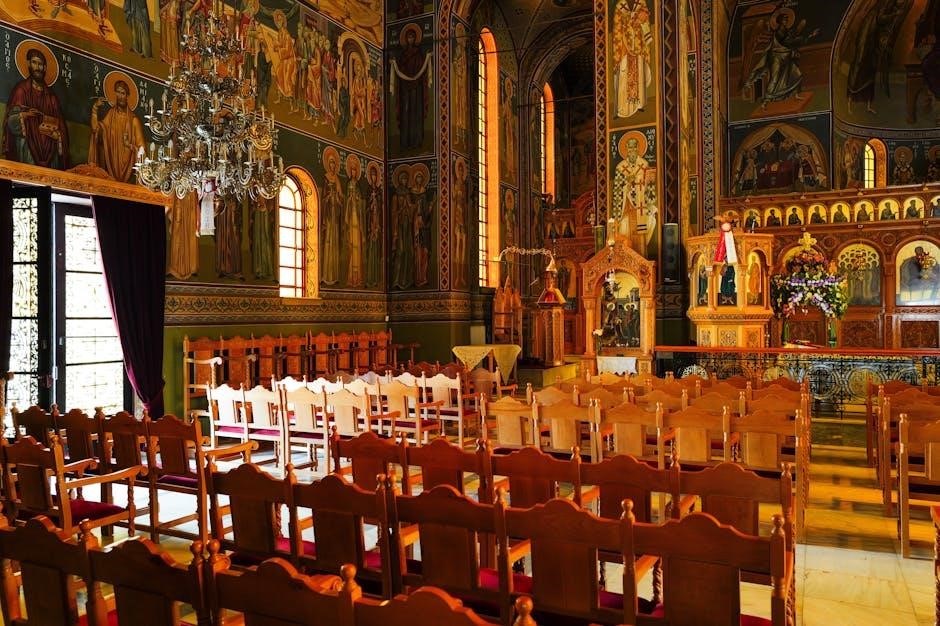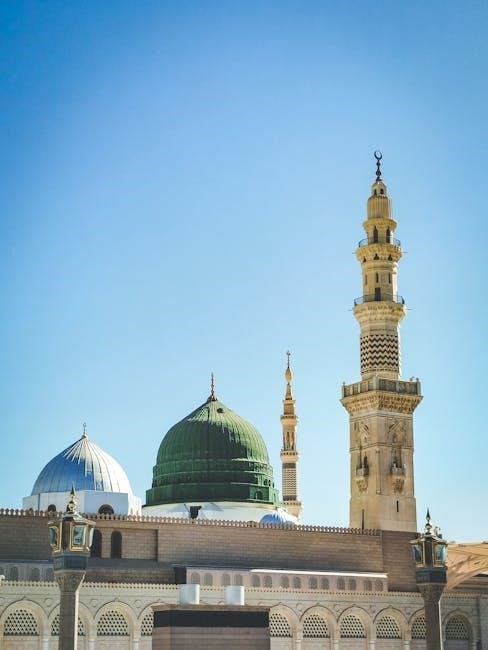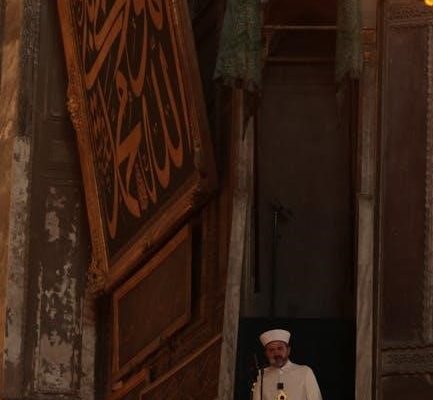The Janaza prayer, or Salat al-Janazah, is a communal obligation in Islam, emphasizing supplication for the deceased’s forgiveness and console. It is a vital ritual and collective duty.
Overview of Janaza Prayer
The Janaza prayer is a unique Islamic funeral ritual performed for the deceased, emphasizing communal supplication for forgiveness. It consists of four Takbirs (saying “Allahu Akbar”) while standing, without bowing or prostration. The prayer is a collective obligation (Fard Kifayah) and is typically performed in congregation, often in three rows. The Imam leads the prayer, and specific supplications, including the Dua for the deceased and their family, are recited after each Takbir. This prayer is a vital way to seek Allah’s mercy and provide comfort to the bereaved.
Importance of Janaza Prayer in Islam
The Janaza prayer holds profound significance as a collective obligation (Fard Kifayah), emphasizing the Muslim community’s responsibility to seek forgiveness for the deceased. It is a final act of charity and respect, demonstrating unity and compassion. The prayer serves as a means to request Allah’s mercy for the departed soul and provide spiritual comfort to the grieving family. Participating in Janaza prayer is a noble deed, reflecting the Islamic value of caring for one another in life and death.

Step-by-Step Guide to Performing Janaza Prayer
The Janaza prayer involves four Takbirs, recited while standing, followed by supplications for the deceased. No bowing or prostration is performed, emphasizing a congregational standing prayer.
Preparation for Janaza Prayer
Preparation for Janaza prayer involves ensuring the deceased is washed, shrouded, and placed in a clean environment. Participants must perform Wudu, wear clean attire, and maintain a state of purity. The prayer is conducted in congregation, with attendees forming at least three rows behind the Imam. The body of the deceased is placed in front of the congregation, facing the Qibla. Proper physical and spiritual etiquette must be observed to honor the deceased and fulfill the communal obligation.
Structure of the Prayer: Takbirs and Supplications
The Janaza prayer consists of four Takbirs (Allahu Akbar) recited while standing. After the first Takbir, the Thana is recited, followed by the second Takbir and Durood. The third Takbir precedes the specific Dua for the deceased, and the fourth concludes with a final Dua. No Ruku or Sujud is performed. The structure emphasizes supplications for the deceased’s forgiveness and mercy, reflecting the prayer’s unique and solemn purpose in Islam.
Concluding the Prayer with Salaam
The Janaza prayer concludes with the Salaam, where the worshipper turns their head to the right and then to the left, greeting the angels and the congregation. This final act signifies the end of the prayer. No additional supplications are made after the Salaam, emphasizing the prayer’s solemn completion. The Salaam is performed once, marking the end of the collective duty, and is executed while standing, as the prayer does not include bowing or prostration.

Dua and Supplications in Janaza Prayer
Dua and supplications are integral to the Janaza prayer, seeking forgiveness for the deceased and blessings for the living. Specific supplications are recited after each Takbir, emphasizing compassion and divine mercy.
Specific Dua Recited After Each Takbir
After each of the four Takbirs in the Janaza prayer, specific du’a supplications are recited. The first du’a after the first Takbir is the Thana, followed by the Durood. After the third Takbir, the congregation recites a du’a seeking forgiveness for the deceased and all Muslims, such as “Allahummaghfir lihayyina wa mayyitina.” The fourth Takbir concludes with a du’a for the deceased’s mercy and the living’s guidance, emphasizing divine compassion and eternal peace.
Meaning and Interpretation of the Dua
The du’a in Janaza prayer holds profound meaning, reflecting supplications for divine mercy and forgiveness. The specific du’a after each Takbir emphasizes seeking pardon for the deceased and all believers. The words “Allahummaghfir lihayyina wa mayyitina” illustrate a collective plea for forgiveness, while other supplications express hope for divine mercy and eternal peace for the departed soul. These prayers underscore the community’s shared responsibility and spiritual bond, embodying Islam’s values of compassion and unity.
Importance of Dua in Janaza Prayer
Dua in Janaza prayer is a vital supplication seeking divine mercy and forgiveness for the deceased. It reflects the community’s collective appeal for Allah’s compassion and blessings.
Significance of Dua for the Deceased
The dua in Janaza prayer holds profound significance as a collective supplication for the deceased’s forgiveness and divine mercy. It serves as a final act of kindness, seeking Allah’s compassion and ease for the departed soul. The community’s united prayer uplifts the deceased’s spiritual journey, offering comfort and hope for their resting place. This sacred ritual embodies the Muslim community’s care and solidarity with the bereaved family, fulfilling a vital religious and emotional obligation.
Recommended Dua to Recite After the Prayer
After the Janaza prayer, it is recommended to recite specific supplications for the deceased. One such dua is: “Allahummaghfir lihayyina wa mayyitina, wa shahidina, wa ghaeebina, wa dhakarina wa unthana, wa sagheerina wa kabireen” (O Allah, forgive our living and deceased, present and absent, male and female, young and old). This dua seeks divine mercy for all Muslims. Reciting such supplications after the prayer is a Sunnah and reflects the community’s collective compassion and concern for the departed soul.

Janaza Prayer PDF Resources
Janaza Prayer PDF resources offer comprehensive guides, including step-by-step instructions, Arabic supplications, and translations, aiding Muslims in performing the prayer correctly and understanding its significance.
Popular PDF Guides for Janaza Prayer
Popular PDF guides like “Namaz-e-Janaza Ki Dua” and “Salatul Janazah” provide detailed instructions on performing the prayer, including Arabic supplications and their meanings. These resources are widely available online, offering step-by-step guidance on the prayer’s structure, such as the four Takbirs, Durood, and recommended supplications. They also cover essential aspects like preparation, etiquette, and the importance of community participation. These guides are invaluable for both learners and practitioners, ensuring correctness and spiritual fulfillment.
Benefits of Using PDF Resources for Learning
PDF resources on Janaza prayer offer comprehensive guidance, including Arabic supplications, translations, and step-by-step instructions. They provide clarity on the prayer’s structure, such as the four Takbirs and recommended Dua. Accessible and portable, these guides are ideal for learning and reference. They cater to diverse learners, ensuring understanding and proper practice. Their availability online makes them convenient for global access, fostering uniformity in performing the prayer. They are invaluable tools for both beginners and experienced practitioners.
Common Mistakes to Avoid in Janaza Prayer
- Forgetting the four compulsory Takbirs, which are essential for the prayer’s validity.
- Reciting incorrect or incomplete Dua, which may invalidate the prayer.
- Not forming proper rows, as the congregation is a key component.
Mistakes Related to the Prayer’s Structure
- Forgetting the four compulsory Takbirs, which are essential for the prayer’s validity.
- Reciting incorrect or incomplete Dua, which may invalidate the prayer.
- Not forming proper rows, as the congregation is a key component.
- Performing ruku (bowing) or sujud (prostration), which are not part of Janaza prayer.
- Not ending with Salaam, which is necessary to complete the prayer.
Mistakes in Reciting Dua and Supplications
Common errors include reciting Dua incorrectly, such as omitting key phrases or mispronouncing Arabic words. Some mistakenly add personal supplications or deviate from the prescribed format. Forgetting to recite specific Dua after each Takbir is another oversight. Additionally, rushing through the supplications or lacking focus may diminish the prayer’s spiritual impact. It is crucial to ensure accuracy and mindfulness in reciting the Dua to maintain the prayer’s validity and effectiveness.

Etiquette and Proper Conduct During Janaza Prayer
Muslims must stand in straight rows, facing Qibla, ensuring purity and silence. Avoid distractions; focus on supplications, reflecting respect and unity in seeking mercy for the deceased.
Physical and Spiritual Etiquette
Physical etiquette requires maintaining purity, performing Wudu, and dressing modestly. Stand in straight rows, facing Qibla, and avoid distractions. Spiritual etiquette involves focusing on supplications, reflecting respect, and unity in seeking mercy for the deceased. Silence and discipline are essential, ensuring the prayer’s dignity and the community’s collective responsibility.
Role of the Imam and the Congregation
The Imam leads the Janaza prayer, reciting the four Takbirs, Thanah, Durood, and specific du’a for the deceased. The congregation follows, ensuring unity in rows and actions. They maintain silence, avoid deviations, and collectively seek mercy. Both roles ensure the prayer’s validity and sanctity, reflecting the community’s shared responsibility for the deceased’s forgiveness.
Role of the Muslim Community in Janaza Prayer
The Muslim community collectively performs the Janaza prayer as a shared obligation (Fard Kifayah), demonstrating unity and seeking divine mercy for the deceased.
Community Obligation (Fard Kifayah)
The Janaza prayer is a communal obligation (Fard Kifayah), meaning it is the duty of the Muslim community to ensure it is performed. If even one person fulfills it, the obligation is lifted from others. However, if no one performs it, the entire community is held accountable. This emphasizes the importance of collective responsibility and unity in supporting the deceased and their family during their time of need.
Encouragement for Participation
Participating in Janaza prayer is highly encouraged as it reflects compassion and solidarity with the deceased’s family. It is a collective act of seeking forgiveness for the deceased and earning divine rewards. The Prophet Muhammad (peace be upon him) emphasized attending funerals to uphold communal support and spiritual benefit. By engaging in this duty, Muslims demonstrate unity and fulfill a moral obligation, fostering a sense of responsibility and empathy within the community.
Time and Place for Janaza Prayer
The Janaza prayer should be performed promptly, avoiding Makruh times like sunrise and sunset. It is ideally conducted in congregation, preferably in a mosque or open area facing the Qibla.
Recommended Times for the Prayer
The Janaza prayer should ideally be performed shortly after the deceased passes away, avoiding Makruh times such as sunrise (Zawaal) and sunset.
It is recommended to conduct the prayer between mid-morning and mid-afternoon when possible. Avoiding sunrise and sunset ensures the prayer’s validity and respect for Islamic guidelines. The prayer is typically performed before the burial, emphasizing promptness and collective participation.
Choosing an Appropriate Location
The Janaza prayer is typically performed in a clean, open space such as a mosque courtyard or an outdoor area facing the Qibla.
The location must be free from impurities and distractions, ensuring a dignified and respectful environment for the congregation. Mosques or designated prayer grounds are ideal due to their sacred nature and accessibility for the community. The space should accommodate the congregation comfortably, fostering unity and focus during the prayer.
The Janaza prayer is a vital Islamic ritual, reflecting communal support and seeking divine mercy. Supplications and PDF guides enhance understanding, ensuring proper practice and spiritual connection.
The Janaza prayer is a communal obligation, emphasizing four Takbirs, specific supplications, and proper etiquette. PDF resources provide detailed guidance on performing the prayer correctly, including the correct Dua and preparation steps. They also highlight the significance of unity and seeking forgiveness for the deceased. These guides ensure Muslims can fulfill their duty with precision and sincerity, adhering to Islamic teachings and promoting spiritual growth.
Final Thoughts on the Importance of Janaza Prayer
The Janaza prayer holds profound spiritual and emotional significance, offering comfort to the bereaved while seeking mercy for the deceased. It fosters unity and shared responsibility within the Muslim community. The supplications and rituals underscore Islam’s emphasis on compassion and collective worship. By adhering to proper guidance, believers honor the departed and uphold Islamic values, reinforcing their connection to faith and community. This prayer is a poignant reminder of life’s transient nature and the eternal hope in Allah’s mercy.



